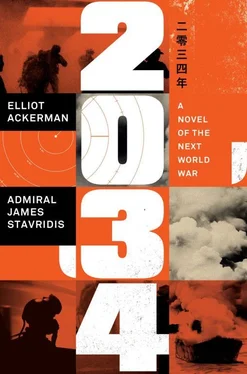The old man nodded once, planted his feet firmly on the ground, and, with his 3-wood gripped tightly, reached into his backswing. His ball exploded off its tee, the sound alone signaling a perfect connection, which arced ever higher. When its trajectory reached its apex, it became apparent that Lin Bao was right. The 3-wood was too powerful of a club.
Zhao Leji’s ball sailed into the water with a plunk .
He bent over, picked up his tee, and then faced Lin Bao, who searched for any expression of disapproval or even disappointment in the old man. There was none; he simply made way for Lin Bao, who sunk his tee into the stubby grass. The thought did occur to him that he could angle his shot into the rough. He imagined that someone more obsequious—someone like Minister Chiang—might throw his game in favor of a senior official like Zhao Leji. But Lin Bao had only risen as far as he had because he’d never indulged the weaknesses of a superior, even when that superior could harm his career or—as was the case with Zhao Leji—end his life.
His 2-iron connected with the ball.
Its trajectory was low and fast, rocketing toward the bend in the fairway. His shot was gaining altitude, but it wasn’t certain that it would be enough to clear the trees. It was like watching an overburdened aircraft attempt to climb above a particularly treacherous mountain face. Lin Bao found himself gesturing with his hands, up, up, up . And then he noticed that Zhao Leji was doing the same; it was as if the old man wanted to be proven wrong. When the ball clipped the top of the trees, it kept going, landing on the fairway right as a few agitated birds took flight from the topmost branches.
“Looks like I’m one stroke behind,” said Zhao Leji through a broad smile. Then the old man stepped over to his golf bag and replaced his 3-wood with a 2-iron.
They spent the better part of the afternoon on the course. That would be the only hole Lin Bao won against Zhao Leji. Though Lin Bao played his best, the old man was a far superior golfer, and it soon became obvious how remarkable it was that Lin Bao had outfoxed him on even a single hole. While they made their circuit around the course, the conversation turned to Lin Bao’s duties and “their natural evolution,” as Zhao Leji put it. He would no longer report directly to Minister Chiang. The disaster at Zhanjiang had forced the Politburo Standing Committee to “reorganize the military command structure,” a statement that Lin Bao recognized for the disciplinary euphemism it was. Zhao Leji then reminded Lin Bao that the People’s Republic was “on death ground,” in an echo of the language used by Minister Chiang, while not attributing that language to him or his subsequent conclusion: “We must fight.” When it came to the details of that fight, Zhao Leji was prepared only to say, “We must take commensurate action to the Americans’ strike at Zhanjiang.”
Lin Bao had felt tempted to remind Zhao Leji of the lesson from only moments ago: when selecting between two nearly equal courses of action it was always best to choose the least ambitious, lest you overplay. But correcting the secretary of the Central Commission for Discipline Inspection on his golf game was one matter; correcting him on affairs of state was quite another. Lin Bao possessed enough gumption for the former but not yet the latter.
If he didn’t speak up against a potential nuclear strike on the United States, he nearly spoke up when Zhao Leji explained what he had planned next for him.
“Some people within the party hold you responsible along with Minister Chiang for Zhanjiang. I wasn’t sure myself until today. My belief is that you advised him as best you could. Perhaps, if he’d kept you closer, we might have avoided that tragedy—provided he would’ve listened to you, which I also doubt. From this point forward, I have taken on his responsibilities in the Defense Ministry. And I will need sound advice… a caddy, as it were.” And he smiled at Lin Bao. “Someone to provide an alternate viewpoint. So, you won’t be returning to your carrier. You’ll return to Beijing instead, to serve as my deputy within the ministry.”
Zhao Leji flagged down a member of his security detail, who appeared swiftly alongside them in a golf cart. The wily old man surely knew that the loss of Lin Bao’s command would be a demoralizing blow, which is why he didn’t wait for his reaction. As Lin Bao climbed next to the driver, Zhao Leji said his goodbyes, telling Lin Bao only, “I will see you in Beijing before long.” He turned to study the fairway and began to select the next club from his bag.
When Lin Bao arrived at reception, the hospitality associate seemed almost surprised to see him again. The member of Zhao Leji’s security detail spoke a few words to her and she escorted Lin Bao back to his room. As she had checked him into Mission Hills, Lin Bao now asked what he would need to do in order to check out. She seemed confused, saying only, “I’ll look into that,” as if she were unfamiliar with the procedure herself and Lin Bao was the first person she had ever needed to check out. When she left him at his door, she asked if he required anything else. Lin Bao reminded her about his dry cleaning, the uniform he’d sent out that morning. He couldn’t make the return trip in his golf clothes. The young woman again seemed unsure and repeated, “I’ll look into that.”
While Lin Bao packed up his few possessions in a shapeless bag, his mind began to wander. Despite Zhao Leji’s obvious frustration with Minister Chiang, he and the Politburo Standing Committee agreed with Chiang’s assessment of the situation. An American blockade off their coast was unacceptable. A counterstrike was the only option. But what form would that counterstrike take? Lin Bao understood that he would be required to have an opinion on the matter as he advised Zhao Leji. And like Minister Chiang, he would be held accountable for that opinion if it proved incorrect. The idea unsettled Lin Bao. He would be in Beijing soon and perhaps he would seek out Minister Chiang. Perhaps his old boss could quietly advise him, even if he had fallen out of favor with the Politburo Standing Committee and Zhao Leji. Perhaps Chiang could help him navigate his new role among these powerful and dangerous men.
A knock at the door interrupted these thoughts.
A young valet stood in the threshold. “This is the dry cleaning I have for your room.”
Lin Bao thanked him and took the hangers covered in transparent plastic. He laid them on the bed next to his bag. As he tore off the plastic, he noticed that the first uniform seemed a larger size than what he wore. It was wider in the stomach. The sleeves extended almost to the jacket’s hemline. When he read the embroidered name tape sewn above the breast pocket, it wasn’t his own—but it was familiar, nevertheless.
It read, Chiang.
What a coincidence, thought Lin Bao—but he only thought this for a moment. He suddenly felt utterly alone. He wouldn’t have his old boss to rely on for advice when he returned to Beijing. It was no coincidence that he and Minister Chiang had stayed in the same room. Nor was it a mistake that Minister Chiang’s uniform had been left behind.

13:03 July 17, 2034 (GMT+5:30)
New Delhi
By any objective measure Farshad had witnessed a spectacular success. His Russian naval counterparts had in a two-week period supported a land campaign conquering several hundred square miles, thus fulfilling a multigenerational strategic imperative: Russia now had direct overland access to its Baltic ports. Atrophied bodies of international governance and alliance, the United Nations and NATO, decried this “aggression,” but Farshad suspected that woven between their declamations was grudging respect. Decades of miscalculation in Washington and Beijing had sown discord into the world order; all the Russians had done was reap the harvest. That other nations—namely Farshad’s own—would try to reap a similar harvest in other locales seemed unsurprising. Equally unsurprising was that his countrymen would bungle it.
Читать дальше













